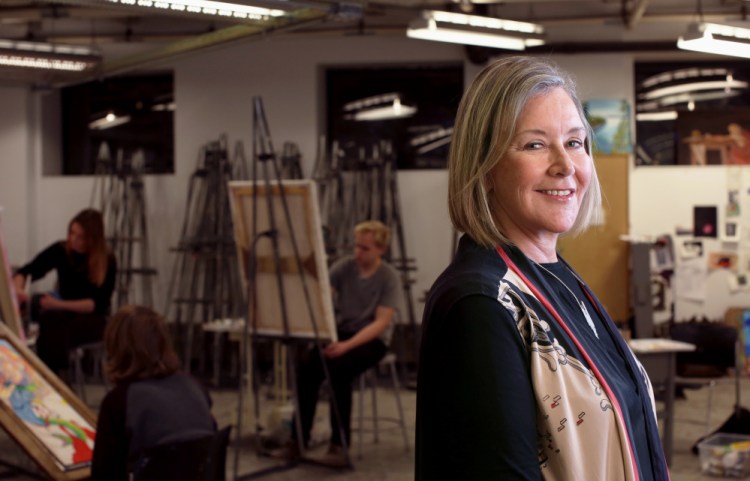Laura Freid has a resume peppered with Ivy League schools that led to a globe-trotting job with a world-famous musician, which she left to become the newest president of Maine College of Art.
“I wanted to do something in my career that could really help artists stay artists their whole life,” she said.
Freid became MECA president this past July, leaving a 12-year partnership with the cellist Yo-Yo Ma and their collaboration, the Silk Road Project. He was the public face of the global cultural arts organization, while Freid served as CEO and executive director. Before that, she worked as chief communications officer at Harvard University and as an executive vice president at Brown University.
Coming to an art school feels like a natural landing spot at this moment in her life and career, and also at this moment in the world. Freid is an advocate for passion-based learning and believes that art-school students are best equipped to handle the challenges and opportunities of the world today and tomorrow, because art is present everywhere we look.
“Designers are the problem-solvers of the future,” Freid said in an interview in her Portland office. “The 21st century is the creative century, and an arts education is a great education to have. We are all walking around with art on our wrists, on our tablets and on our phones. We need people in the world who can present that art in a beautiful way.”
Freid lives in a condo in Portland’s East End and walks to work most days. She appreciates the vibrancy of Munjoy Hill and Portland as a whole. Her husband lives and works in Massachusetts, and they own a house in Newton.
She spent her first 100 days in Portland listening. She’s met with more than 800 people since she arrived in July, including folks directly associated with MECA and those on the periphery of the school.
She said yes to MECA because she wanted to further integrate her interests in arts and education. Freid studied philosophy as an undergraduate at Washington University, earned a master’s in business from the Boston University School of Management and a doctorate in education from the University of Pennsylvania. “My intellectual interest is in aesthetics and the philosophy of aesthetics, so art is very important to me, and I think to the world,” she said. “Art helps us understand what’s going on in our life.”
Mostly, she loves being around students who are creative, active and engaged. The period in people’s lives between the ages of 18 and 24 are when so many transformational experiences occur, “and when you find out who you are and what you contribute to your world,” she said.
When Freid researched MECA after being asked to apply, one of the things she noted was the school’s Artists at Work program, which connects students to internships, jobs, commissions, professional development opportunities, community partners and residencies so they can work in their fields of training. At Harvard, Freid began a cultural entrepreneurship program that encouraged artists and business people to create businesses that serve society. She saw parallels between the program at Harvard and the program at MECA and was impressed.
As president, her job is to figure out what the school will look like in five, 10 and 20 years from now.
The challenges are mostly financial, and those are tied to the cost of doing business in Portland. MECA’s fall enrollment was 512, which continues a trend of enrollment increases. Of those students, about half live in downtown dorms owned or rented by MECA. The school has to increase its housing stock at a time when affordable housing is harder to find. “Supply and demand is decreasing our students’ ability to find housing at a reasonable cost,” Freid said. “We want students to focus on their learning and not have to worry too much about their housing.”
Toward that end, she has convened an informal task force to explore downtown options. The next step will be making a plan and raising money. The school’s annual budget is $14.3 million, and Freid said the school “needs to increase fundraising and corporate and foundation support.”
The opportunities are as endless as imagination. She wants MECA students to “go deep” in their studies so they can avail themselves to all possibilities.
When she talks about MECA to people in the community, she reminds them of the importance of creativity in America’s economy and culture. “It’s important to understand that everything we touch and see and feel has been designed and made by somebody,” she reminds people. “When we go online, everything we look at was designed by an artist.”
Supporting students through scholarships, she said, is one of the most important things a person can do. That’s especially true now, when America’s investment in the arts is less than solid. “We spend a lot of time applauding ourselves for our creativity, but we are not investing enough in the creative leaders of tomorrow. If we don’t watch it, we might turn out like some societies that have very accomplished engineers and mathematicians, but they are lacking creativity. And when you lack creativity, you aren’t innovating.”
Send questions/comments to the editors.




Comments are no longer available on this story